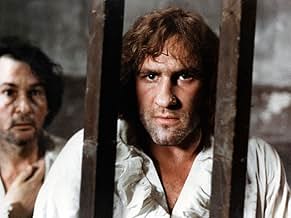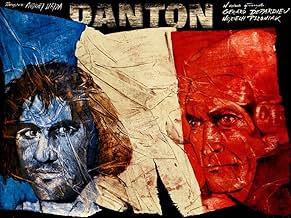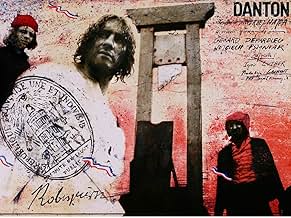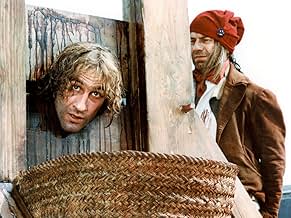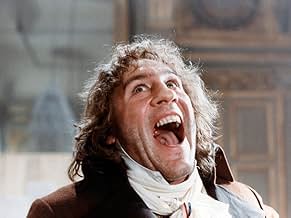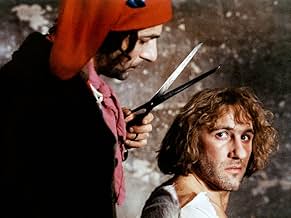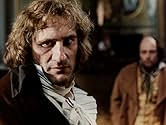CALIFICACIÓN DE IMDb
7.4/10
8.1 k
TU CALIFICACIÓN
En 1793, cuando comienza el Terror en Francia, Georges Danton, un campeón del pueblo, regresa para enfrentarse a Maximilien Robespierre y su partido extremista.En 1793, cuando comienza el Terror en Francia, Georges Danton, un campeón del pueblo, regresa para enfrentarse a Maximilien Robespierre y su partido extremista.En 1793, cuando comienza el Terror en Francia, Georges Danton, un campeón del pueblo, regresa para enfrentarse a Maximilien Robespierre y su partido extremista.
- Dirección
- Guionistas
- Elenco
- Ganó 1 premio BAFTA
- 7 premios ganados y 7 nominaciones en total
Patrice Chéreau
- Camille Desmoulins
- (as Patrice Chereau)
Alain Macé
- Héron
- (as Alain Mace)
Opiniones destacadas
10lavean
This is one of the best movies on the French Revolution ever produced. Being a person well versed in the the period I was amazed at the level of detail. The costumes are spot on. Even the detailed little day to day items such as ink wells, serving plates etc are all perfect. As an American living in France who has access to the sites in the movie through his membership in various historical associations such as the Napoleonic Alliance I can not over state how impressed I was with the visual accuracy of the film.
The dialogue where known is virtual quotations and the where not recorded is in character. I was extremely pleased with this movie and am disappointed that it is not out on DVD yet. This is how historical drama should be done. Must see....
The dialogue where known is virtual quotations and the where not recorded is in character. I was extremely pleased with this movie and am disappointed that it is not out on DVD yet. This is how historical drama should be done. Must see....
Danton was a hero and one of the founders of the French Revolution of 1789. This movie is set five years later and the revolution has morphed into something ugly. While initially the revolution promised freedom, at this point the small committee running the country is extremely repressive and is a dictatorship. Danton and his friends were angry at how the country wasn't better off in 1794 than it was BEFORE they got rid of their king, so they begin criticizing the government. The movie begins as the printer who makes critical pamphlets concerning the government is beaten and his business is destroyed. So much for "liberty, equality and fraternity"! So, as a result of being silenced this way, Danton et al begin publicly criticizing the government. Eventually, Robespierre (the leader of the committee) and his cronies trump up charges, have a show trial and get rid of the dissent. Some have mentioned that the Polish director, Wajda, also intended this to be a criticism of his own nation--which, at the time, was Soviet-dominated and very repressive as well. This makes sense as you see the movie unfold--especially when the government destroys all dissent "in the name of the people".
The acting is fine, the story compelling and I have no major criticism of the film. However, I really wish the ending had been handled differently. Especially because other than history lovers and French people, most probably have no idea that this execution helped to end the government. AFTER this purge of Danton in April 1794, Robespierre himself was executed in July 1794 because the country had just had enough--plus, those surviving Frenchmen knew that they, too, would face the guillotine sooner or later if this sick system remained in place. Some sort of an epilogue would have been nice--such as showing the soldiers coming for Robespierre. He responded by trying to kill himself first, but he only succeeded in blowing off part of his face--still alive, he was guillotined shortly afterward. This would have been a dandy little epilogue and could have been done in about five minutes. However, not showing a connection between Danton's death and the fall of the government is an odd thing to omit.
The acting is fine, the story compelling and I have no major criticism of the film. However, I really wish the ending had been handled differently. Especially because other than history lovers and French people, most probably have no idea that this execution helped to end the government. AFTER this purge of Danton in April 1794, Robespierre himself was executed in July 1794 because the country had just had enough--plus, those surviving Frenchmen knew that they, too, would face the guillotine sooner or later if this sick system remained in place. Some sort of an epilogue would have been nice--such as showing the soldiers coming for Robespierre. He responded by trying to kill himself first, but he only succeeded in blowing off part of his face--still alive, he was guillotined shortly afterward. This would have been a dandy little epilogue and could have been done in about five minutes. However, not showing a connection between Danton's death and the fall of the government is an odd thing to omit.
This is one of the most amazing movies... Anyone who says that Gerard Depardieu portrayed Georges Jacques Danton "wrongly", and who purports that Danton was "not" the huge, strong, charismatic, man of the people that Depardieu portrayed him as obviously has not done much research on the French Revolution. George Jacques Danton was like this exactly. The contrast between Robespierre's incessant paranoia and reservedness (conveyed perfectly by Wojciech Pszoniak...an EXCELLENT job) and Danton's relaxed approach towards the problems with which he was faced, extreme easiness and likeness among people, and the dynamic way with which he approached the mob of Paris' unemployed masses and people in general was spot on: the two men were complete opposites. This movie developed the characters of the French Revolution so well, it is unbelievable. It ENTRAPPED the personalities of all those great, complex, astounding men that gave this extraordinary period of time its distinct shape. Saint-Just, Desmoulins, Robespierre, Danton, all of them...they were painted so accurately. This movie truly brought these incredible men to life. I have to say, the score of this movie was incredible. It brought out all the proper emotions. Overall, an astonishing movie.
a parable. about dictatorship and its colors. about people as crumbs of a lunch. a manifesto for freedom from a Polish director for who a play is perfect instrument to discover a regime behind its masks. Danton is a beautiful movie but in great measure it is a profound analysis. French Revolution is not an excuse for present realities from Jaruzelski regime but way to remember the root of all Communism sins. Danton may be Trotski, prey of spider web who he build it. Robespierre - just piece of a huge machine. the fake image is only protection. the lies about people needs - only form to survive. so, the film is, in great measure, collection of symbols. the revolution - picture of a demon out of any measure. and, in this case, purpose is not to create an impressive work but to give the dimension of truth. history is only vehicle for ideas. because this revolution, ambiguous, cruel, chaotic, cynical, criminal is more than chapter of Modern time. it is shadow of each regime for who people are pieces on the chessboard. and subjects for experiments.
its universal message about price of revolution, about power of a small group, about the way of good intentions, about people's interest as excuse for use the force for preserve the power . it is an amazing portrait of French Revolution. and Danton of Depardieu remains one of his greatest roles. but the axis is the vision of director. because the film is a parable in essence. because it is a film about Communism who represents just an ideological fruit of French Revolution. because Wajda knows the importance of testimony about the evil of a political system. because it is a honest work about illusion and ambition and need to control the power. in same measure, it is not only a manifesto but a beautiful movie who recreates more than atmosphere but the spirit of a fight for power. yes, France of Robespierre is Poland of Jaruzelski . but the science to transform a historical page in a contemporary event's reflection and the case of Poland in universal warning gives force and profound senses to this admirable film.
¿Sabías que…?
- TriviaRobespierre and all the characters in his faction are played by Polish actors speaking in Polish, dubbed into French for the French release, while Danton and all the characters in his faction are played by French actors speaking in French.
- ErroresRobespierre tells Jacques Louis David to remove Fabre d'Englantine from the painting of the Tennis Court Oath. David objects, saying, "But he was there," but removes d'Englantine. In truth, d'Englantine did not take part in the Tennis Court Oath, since in 1789 he was not a deputy to the Estates General. Thus, the film falsifies history.
- Citas
Robespierre: For the country's good we must be ruthless. We can't afford to be just. We'd have to rule by terror. You know what that is? Terror is nothing but despair.
- Créditos curiososAnne Alvaro gets an "and introducing" credit ("et pour la première fois à l'écran").
- Versiones alternativasThe dialogue in the dubbed version with American voice actors sometimes differs sharply from the original: for example, Robespierre's last words to Saint-Just are not the dismissive "Don't wake me when you leave" ("Ne me réveillez pas quand tu sortiras") but the prophetic "Whatever happens will happen soon" (so that, like Danton, he apparently realises he will shortly meet Danton's fate).
Selecciones populares
Inicia sesión para calificar y agrega a la lista de videos para obtener recomendaciones personalizadas
- How long is Danton?Con tecnología de Alexa
Detalles
- Fecha de lanzamiento
- Países de origen
- Idioma
- También se conoce como
- Дантон
- Locaciones de filmación
- Jossigny, Seine-et-Marne, Francia(interiors: Danton's house)
- Productoras
- Ver más créditos de la compañía en IMDbPro
Contribuir a esta página
Sugiere una edición o agrega el contenido que falta

Principales brechas de datos
By what name was Danton (1983) officially released in India in English?
Responda

